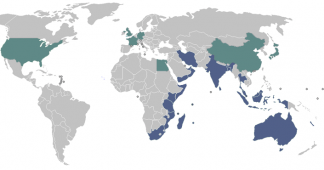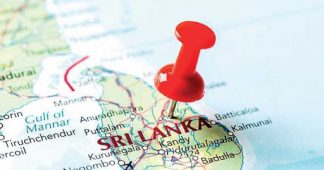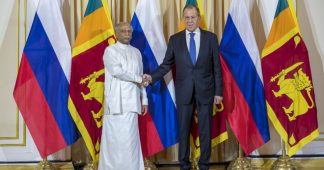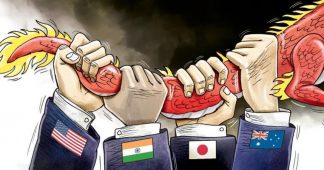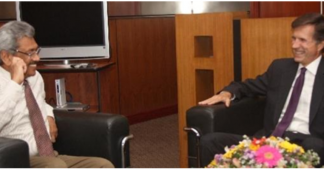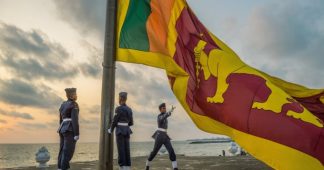By Lasanda Kurukulasuriya
The launch in Colombo of a Trilateral Maritime Security Secretariat, for cooperation between Sri Lanka, India and the Maldives, merits closer scrutiny. This is on account of revelations contained in a newly declassified document from Washington, that could throw light on the provenance of the new entity.
The Secretariat, located at Sri Lanka Navy (SLN) headquarters, was formed on March 1st to facilitate continuation of National Security Advisor level meetings, according to an SLN statement. Agreement for this was reached at a meeting of defence chiefs of the three countries hosted in Colombo last November. The new Secretariat will focus on the current maritime security environment in the region and, among other things “discuss new areas of cooperation in the fields of maritime security and threats” the statement said. Defence Secretary Gen. (retd.) Kamal Guneratne represented Sri Lanka at the launch while India and the Maldives were represented by the Defence Attaches of their High Commissions in Colombo.
Secret US document
Interestingly, a secret 2018 national security document titled ‘US Strategic Framework for the Indo Pacific,’ declassified on January 5th – with the Trump administration on its way out – describes the formation of such an entity, among its plans for India and South Asia. It describes a US objective to “Accelerate India’s rise and capacity to serve as a net provider of security and Major Defense Partner.” Another listed objective is to “Strengthen the capacity of emerging partners in South Asia, including the Maldives, Bangladesh, and Sri Lanka, to contribute to a free and open order.” Among the actions to that end, is one to “Establish a new initiative with South Asian partners modeled on the Maritime Security Initiative in Southeast Asia to improve maritime domain awareness, interoperability, and DATA SHARING WITH THE UNITED STATES” (emphasis added). Is it this latter proposition that has materialized as the newly formed Trilateral Maritime Security Cooperation Secretariat in Colombo?
Information on the new Secretariat is scant. There is no reference to ‘interoperability’ relating to security operations or ‘data sharing with the United States.’ The declassified US document however makes it clear that the measures described relate to America’s plans to push back against a rising China, that threatens to eclipse US hegemony in the region. The first of the ‘National Security Challenges’ it mentions is “How to maintain U.S. strategic primacy in the Indo-Pacific region and promote a liberal economic order while preventing China from establishing new, illiberal spheres of influence, …”. It assumes that “A strong India, in cooperation with like-minded countries, would act as a counterbalance to China,” adding that “Chinese economic, diplomatic, and military influence will continue to increase in the near-term and challenge the U.S. ability to achieve its national interests in the Indo-Pacific region.”
Is it a coincidence that Indian PM Narendra Modi launched a ‘Mercantile Maritime Domain Awareness Centre’ in India on March 2nd – the day after Sri Lanka launched its Trilateral Secretariat? “India is sharing this system with Sri Lanka and the Maldives,” the Hindu BusinessLine reported, adding that the facility also has ‘elements of security.’ It’s worth noting too, that on March 4th, a delegation led by the Air Component Commander of the U.S. Indo-Pacific Command, Gen. Kenneth Wilsbach paid a courtesy call on Defence Secretary Gunaratne at the Defence Ministry. That was on the sidelines of events relating to the Air Force 70th anniversary celebrations.
India is designated a ‘major defence partner’ of the US, and has concluded four key defence agreements with the superpower, the last of which was the Basic Exchange and Cooperation Agreement (BECA), in October last year. “The sensitive satellite and sensor data provided by the US under the agreement will allow India to keep a close watch on the movements of Chinese warships in the Indian Ocean,” NDTV reported at the time.
US-Maldives defence agreement
Meanwhile, a month earlier, the Maldives signed a defence agreement with the US. “In a sign of the changed dynamics in the region, there is strong support in New Delhi for the defence framework agreement signed between Maldives and United States, a pact which brings the island nation firmly into the ‘Indo-Pacific’ side of the emerging geopolitical maritime fault line pitting the US and its allies against China,” wrote Devirupa Mitra in The Wire.
A news release from the US Dept. of Defense said that the Deputy Assistant Secretary of Defense for South and Southeast Asia Reed Werner, and Maldivian Minister of Defense Mariya Didi, signed the ‘Framework’ for U.S. – Maldives ‘Defense and Security Relationship’ in Philadelphia on September 10. It gave few details. “Both sides reiterated their commitment to a free and open Indo-Pacific that promotes the security and prosperity of all nations in the region” it said.
“Washington has three South Asian nations in sight for her grand plan in collaboration with India: Sri Lanka, Maldives and Bangladesh,” wrote Washington-based defence analyst Daya Gamage. Flagging some key points from the declassified US document he noted that “…Washington’s desire to further strengthen India directly affects Sri Lanka as India acts as a proxy to Washington …”
The ‘Free and open Indo Pacific’ concept is widely interpreted as code for a concerted push back against China. Mitra offers the following elaboration of it: “The Indo-Pacific – or the Free and Open Indo-Pacific, as the US calls it – is a construct that envisions the region stretching from the Arabian Sea and Indian Ocean in the west to the Pacific Ocean in the east as a strategic continuum in which the US, India and other maritime powers with shared interests act in concert to keep Chinese influence in check.”
Squaring the circle
Besides historical ties, Sri Lanka has significant Chinese investment in infrastructure projects and has signed up on its ambitious Belt & Road initiative. China strongly supports Sri Lanka in international fora, as demonstrated at current sessions of the UN Human Rights Council in Geneva. At the same time it appears that Sri Lanka has been drawn into strategic designs of the US that target China as an adversary. An Acquisition and Cross Servicing Agreement with the US was renewed in an extended format in 2017.
At the November meeting of defence chiefs from Sri Lanka, India and Maldives last year, a joint statement issued by SL Ministry of Defence said the three countries ‘exchanged views on common security threats,’ and agreed to expand the scope of intelligence sharing. Given the deepening defence ties the US has with India, and now the Maldives, and with a secret US document revealing US intent to “improve data sharing” through a “new initiative with South Asian partners,” the question is, will data and intel from Sri Lanka be shared with the US as well?
How can Sri Lanka square the circle of these contradictory lines in foreign policy, and expect to be seen as ‘Non-aligned’ to boot?
At the launch of Sri Lanka’s Maritime Security Secretariat, Foreign Secretary Adm. (retd.) Jayanath Colombage said “The entire world is benefitted from this initiative as the Indian Ocean is the lifeline of the entire world.” Asked to explain what he meant, in the light of its possible origins in a secret US national security document, Colombage argued that in 2018 “those concepts were there,” but not any longer – though “India may be wishing for that.” The concept of a Maritime Domain Awareness Centre has been around since 2011 he said. Asked about the possibility that data or intelligence shared with India might reach the US, with risk of being used against China – especially in view of the intel-sharing aspect of BECA – Colombage insisted there are only three countries involved. “We partner with India. If India shares with someone else, we can’t help that.”
